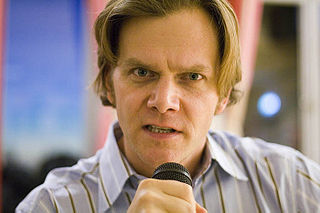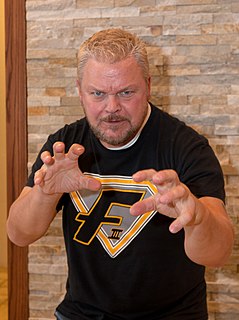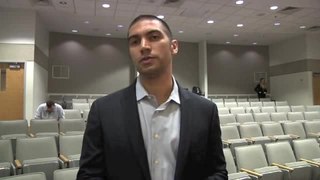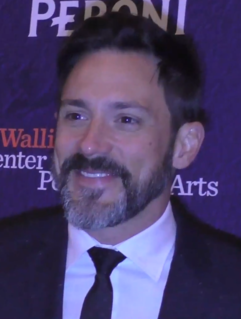A Quote by Natasha Trethewey
My father, Eric Trethewey, is a poet, so I had one right inside the house. And on long trips, he'd tell me, if I got bored in the car, to write a poem about it. And I did find that poetry was a way for me, I think as it for a lot of people, to articulate those things that seem hardest to say.
Related Quotes
That's one of those questions that would just love to have a pat answer. You know, poetry's job is to make us feel good. Poetry exists to allow us to express our innermost feelings. There isn't one role for poetry in society. There are many roles for poetry. I wrote a poem to seduce my wife. I wrote a poem when I asked her to marry me. Poetry got me laid. Poetry got me married.
A successful poem says what a poet wants to say, and more, with particular finality. The remarks he makes about his poems are incidental when the poem is good, or embarrassing or absurd when it is bad and he is not permitted to say how the good poem is good, and may never know how the bad poem is bad. It is better to write about other people's poetry.
There is this tendency to think that if you could only find the magic way, then you could become a poet. "Tell me how to become a poet. Tell me what to do." . . . What makes you a poet is a gift for language, an ability to see into the heart of things, and an ability to deal with important unconscious material. When all these things come together, you're a poet. But there isn't one little gimmick that makes you a poet. There isn't any formula for it.
A trouble with poetry is the presence of presumptuousness in poetry, the sense you get in a poem that the poet takes for granted an interest on the reader's part in the poet's autobiographical life, in the poet's memories, problems, difficulties and even minor perceptions. I try to presume that no one is interested in me. And I think experience bears that out. No one's interested in the experiences of a stranger - let's put it that way. And then you have difficulty combined with presumptuousness, which is the most dire trouble with poetry.
That perhaps is your task--to find the relation between things that seem incompatible yet have a mysterious affinity, to absorb every experience that comes your way fearlessly and saturate it completely so that your poem is a whole, not a fragment; to re-think human life into poetry and so give us tragedy again and comedy by means of characters not spun out at length in the novelist's way, but condensed and synthesized in the poet's way--that is what we look to you to do now.
I write poetry to figure things out. It's what I use as a navigating tool in my life, so when there's something that I just can't understand, I have to "poem" my way through it. For that reason I write a lot about family, because my family confuses me and I'm always trying to figure them out. I write a lot about love, because love is continually confusing in all of its many glorious aspects.
If you've ever been to a poetry slam, you know that the highest scoring emotion is self-righteous indignation: how dare you judge me. So in that way, the poem, 'What Teachers Make,' is an absolutely formulaic slam poem designed to allow me to get up on my soap box and say, 'Let me tell you what really makes me angry.'
People can say what they want about Eric Bischoff, and I've heard a lot of people make negative comments about him. I'll comment on his booking. His booking is not what I look for in wrestling, but that said, I will always be appreciative and thankful to Eric Bischoff for offering me the contract he did, when did because it saved my financial life.
I wrote poetry for seven or eight years, maybe longer, before I could say I was a poet. If people asked, I'd say I wrote poetry; I wouldn't go further. I was in my mid- to late-thirties before I felt that I was a poet, which I think meant that I had begun to embody my poems in some way. I wasn't just a writer of them. Hard to say what, as a poet, my place in the world is. Some place probably between recognition and neglect.
One of the hardest things for me to do is be fully open in a poem. By that I mean, honest and not trying to amplify some mythological version of myself. I was a poor, geeky black kid in Indianapolis. There is nothing mythological about that. So to try to truly render the kind of economic and racial inequity I grew up in, I had to find a way to be more honest about what happened. And it wasn't fun to write, even though the poems aren't 100% autobiographical.
For me, music is sort of my passion, more so than being an actor. I just never tried to make a career as a musician. It was just something that I did on my own time, just for me. I had written a lot of songs, but I don't really record a lot of music because, for me, it's the same way as a poet: I write to get things out. It's sort of cathartic.
religion is about having the right answers, and some of their answers are right... but i am about the process that takes you to the living answer... it will change you from the inside. there are a lot of smart people who are able to say a lot of right things from their brain because they have been told what the right answers are, but they don't know me at all.





































